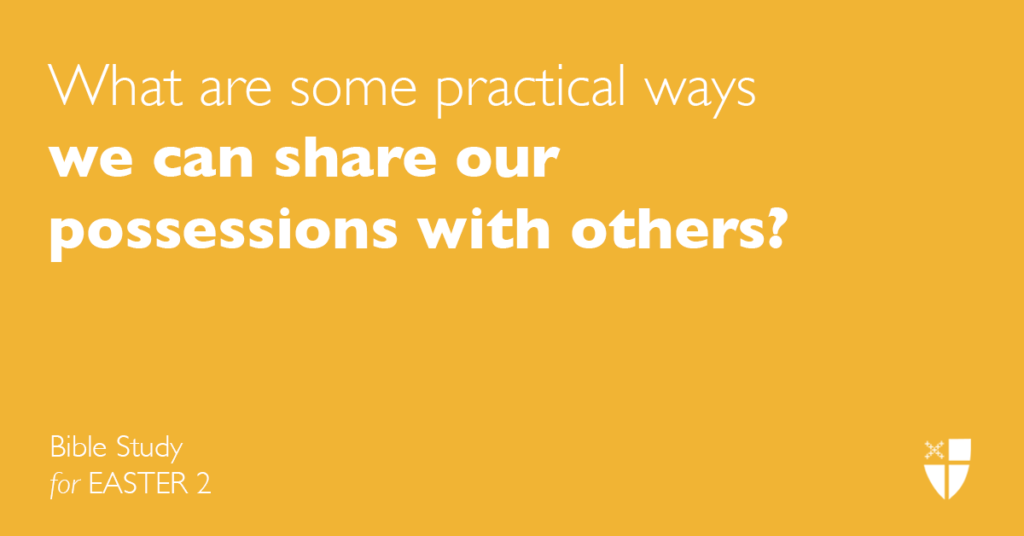This page is available in: Español
Bible Study: Easter 2 (B) – 2021
April 11, 2021
RCL: Acts 4:32-35; Psalm 133; 1 John 1:1-2:2; John 20:19-31

Acts 4:32-35
Several years ago, I was in a church where the preacher decided to conduct an experiment. He told the congregation that he was taking up an offering for those who needed it. And with no other explanation, the offering plates were passed, and people gave. After asking people to raise their hands if they knew of a single parent who had a need, he then had ushers count the money and divide it up into envelopes. Those who raised their hands were asked to come up to the front, pick up an envelope, and were told to give it to whomever in the church they had determined had a need. The people were encouraged to give the envelope to the recipient in private. This is what is happening in our scripture lesson, and we see the practicality of the Gospel in action: The believers in this assembly were in agreement. They agreed to share their possessions – and there was not a needy person among them.
The people of this assembly were no doubt impacted by the unselfish acts they experienced or witnessed, just like those of us in the church I spoke of earlier. On that Sunday, I was one of the recipients of an envelope. I remember someone coming up to my car window, she smiled and said, “Here Rita, this is yours,” as she handed me the envelope. I was stunned because I was not expecting this. But someone did see this widow with young children and saw that I had needs. I have never forgotten that experience because I saw the Gospel in action.
- If you are part of an assembly, in what ways are you of “one heart and soul” with the other believers?
- What are some practical ways we can share our possessions with others?
Psalm 133
This is a psalm, though short, that is full of symbolism. A psalm of national unity, it alludes to Jerusalem once again being the location of the Temple of God, along with the lineage of the Aaronic priesthood. The picture of oil being poured over Aaron’s head, running down his beard and vestments provides a glimpse of the anointing of God’s chosen priest. Anointing oils were combined and produced with great care. Considered to be very precious, only the purest forms of aromatic perfumes were used for such oils.
Mt. Hermon was known to produce copious amounts of dew, such that the surrounding drier lands depended on this moisture. The Temple Mount in Jerusalem would have depended on this refreshing dew, especially during the drier summer months.
Between the symbolism of the combined precious oils, unification of kindred folks, and a flourishing Jerusalem, the psalmist has painted a picture of a reunified family that is thriving, nourished, and beckoning.
- What does your prayer for national unity sound like today?
- If you have experienced a family reunion, how did it feel to see relatives whom you had not seen for many years? In what ways did this reunification strengthen family bonds?
1 John 1-2:2
Since 1 John does not begin the same way other epistles do, with a definite salutation and location, scholars believe it could have been a sermon instead of a letter. From the start, the writer lays the groundwork, showing they had been with Jesus, had seen and touched Jesus. It was important that the hearers grasped that what they were hearing was not second-hand knowledge.
We are presented with a paradox. The writer weaves in and out of God being light and not darkness. We are reminded that being in Christ means not living in darkness but in light. We are told that if we say we have no sin, we would be lying; and that if we do sin, we are living in darkness. But there is good news! We are not left unprotected, because Jesus is our advocate and will cleanse us from all sin.
- When you hear a story, do you consider it more reliable if you hear it from someone who was actually there, as opposed to hearing it second- or third-hand?
- How does it feel hearing that you are going to sin, and when you sin, Jesus has your back? Do you feel exposed, or do you feel protected?
John 20:19-31
It is often said that Thomas has been given a bad rap. For many centuries now, the apostle Thomas has been known as “Doubting Thomas.” But Thomas was not present when Jesus appeared to the other apostles. And, just like Thomas later, they didn’t know who Jesus was until he showed them his wounded hands and sides. A week later, when Jesus appeared again, Thomas only needed to see what Jesus had already shown the other apostles. Jesus showed his wounds to Thomas. And Jesus allowed him to touch his wounds. That is when Thomas believed. Yet Jesus does not tell Thomas he was wrong, though he did remind Thomas not to doubt but believe.
Jesus also reminded Thomas how blessed are those who believe after merely hearing. We do not have the opportunity to investigate Jesus’ wounds. We have only read and heard that he is alive, and yet we still believe.
- Do you think Thomas deserves the nickname “Doubting Thomas”? Why or why not?
- Was there ever a time when you doubted that the Lord was present?
This page is available in: Español
Don’t forget to subscribe to the Sermons That Work podcast to hear this sermon and more on your favorite podcasting app! Recordings are released the Thursday before each liturgical date.
Receive Free Weekly Sermons That Work Resources!
This page is available in: Español


